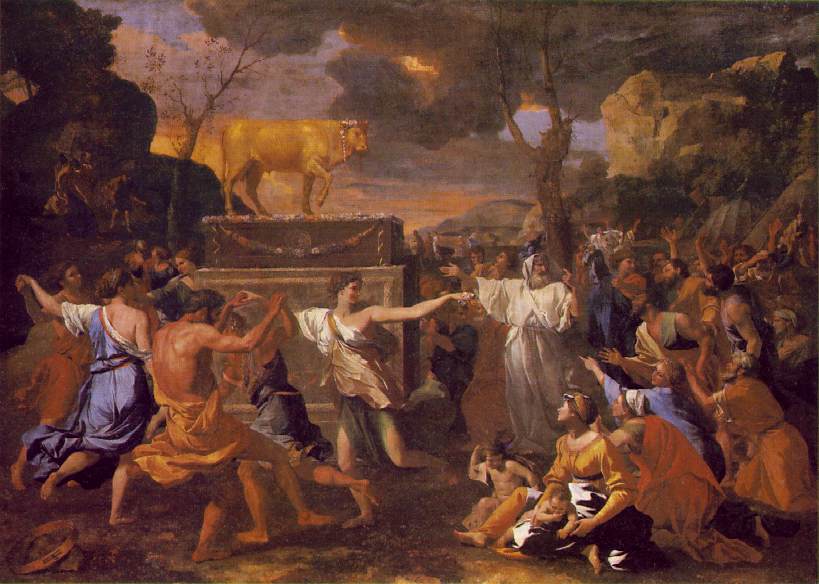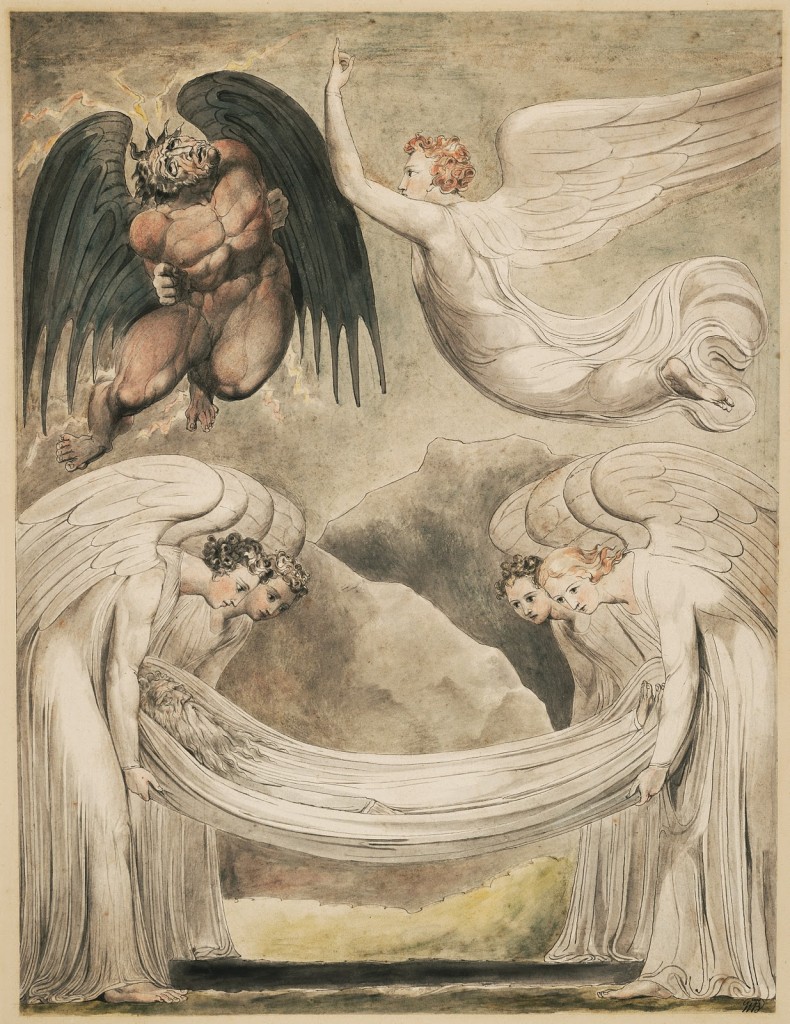A space with which the undead can talk without moral constraint. Its a de-mythologizing of what is known as Judeo-Christian thought. Mostly disenchanted and without trust in the Covenant nor faith, slightly minimalist and with nihilistic overtones: fatalistic romanticism trampling on the death instinct. When repressed traditions see the light of day there is some bashing and crashing of the normative, a piercing of the Platonic and some unsavory name calling such as Harold Bloom terming as “absurd fiction” and an artificial construction, politically expedient to what we refer to as Judeo-Christian.

Poussin. Adoration of the Golden Calf. ---Read More:http://www.artinthepicture.com/paintings/Nicolas_Poussin/The-Adoration-of-the-Golden-Calf/
Bloom uses the term Yahweh. Its hardly normative. Is it normal? Is it blasphemous? Is he kicking the house of Western Civilization over a cliff? Will he be struck down by lightning or some new plague for describing him as violently crazy, ridiculous and mad; a nut job for dragging the yids for forty years in the desert, both them and him becoming increasingly insane with each passing glance. Maybe the three-quarters of the slaves that stayed in Egypt were not that bone headed after all, choosing to wallow in the quiet desperation than follow a frisky old pony like Bloom clamoring after the naive doe eyed newbies like Naomi Wolf at Yale.
Bloom: …I am talking about the actual text of the Tanakh. There are thousands and thousands of times in that text the name Yahweh occurs. It became a tradition very early on among normative Jews that this was the unspeakable name of God. But nevertheless, that is the name, and the name seems to have been inaugurated by the J writer or the Yahwist, when Moses is going to be going down into Egypt rather reluctantly and says, “They’ll laugh at me. Who shall I say has sent me?” and gets the massive punning answer, “Say that ehyeh asher ehyeh has sent you,” which is invariably translated as “I am that I am” but actually means “I will be that I will be”–or to put this into English so it is coherent, “I will be present wherever and whenever I choose to be present.”…

---One of my favorite passages in the book is what I am talking about--the ridiculous attempt on the part, first, of the neo-Platonising Jews like Philo of Alexandria, and then later the high rabbinical sages to get rid of what they might call the anthropomorphic element and say he isn't a man, he isn't a human, he doesn't do certain things, since it's made very clear that he's walking down the road frequently, that he's picnicking, that he's doing this, that, and the other thing, that he's burying Moses with his own hands, he is closing the door of the Ark with his own hands, and so on. Yahweh is a human, all-too-human, much, much too human God, and very scary. He is irascible, he's difficult, he's unpredictable, and he himself doesn't seem to know what he is doing. Read more: http://www.beliefnet.com/Entertainment/Books/2005/12/Cons-Who-Rule-A-Ruined-World.aspx?p=2 image:http://wisdomofthewest.blogspot.com/2012/01/mosaic-sadness-part-1.html
And as I grimly keep repeating throughout the book quite deliberately, that necessarily also means, “And I will be absent wherever and whenever I choose to be absent.” And there’s a lot more evidence in the last 2,000 years for the absence of this personage than the presence.
Yahweh certainly doesn’t come across as a sympathetic character…
You have to be absolutely a bad reader or crazy or so bound by Judaic tradition of that kind which produces Satmars or Orthodox… how can you possibly like him? He’s very bad news.
Yet you seem to have a certain affinity…

Moses by Micehelangelo.---It is a very strange irony, that Allah of the "recital" or Koran has on the whole more features in common with the original Yahweh, though he's by no means identical with him. And what are some of those commonalities? Total authority, total demand for submission. Remember that Islam is a word meaning submission, and the Muslim is one who submits to the supposed will of God. It's the assumption of total authority. Read more: http://www.beliefnet.com/Entertainment/Books/2005/12/Cons-Who-Rule-A-Ruined-World.aspx?p=3#ixzz1lwCU8Srz---image:http://larryavisbrown.homestead.com/files/OT_history/unit2/Unit2a.htm
He interests me greatly. I say toward the end of the book, I would like to tell him to just go away, since he’s gone away anyway, but it isn’t that easy. I end the book on a rather wistful note. There may be a little irony in the wistfulness, but I well remember the last sentence in the book, and it’s very deliberately the last sentence, speaking of Yahweh it says, “Will he yet make a covenant with us that he both can and will keep?”Read more: http://www.belie
.com/Entertainment/Books/2005/12/Cons-Who-Rule-A-Ruined-World.aspx?p=2#ixzz1lw6OnGop
---Zizek:recently resurfaced in some circles in the US, a proposal to "rethink" the rights of necrophiliacs (those who desire to have sex with dead bodies). Why should they be deprived of it? The idea was formulated that, in the same way people sign permission for their organs to be use for medical purposes in the case of their sudden death, one should also allow them to sign permission for their bodies to be given to necrophiliacs. This proposal is the perfect exemplification of how the Politically Correct anti-harassment stance realizes Kierkegaard's old insight into how the only good neighbor is a dead neighbor. A dead neighbor - a corpse - is the ideal sexual partner of a "tolerant" subject trying to avoid any harassment: by definition, a corpse cannot be harassed; at the same time, a dead body does not enjoy, so the disturbing threat of the excess-enjoyment to the subject playing with the corpse is also eliminated. --- Read More:http://www.lacan.com/zizbobok.html image:http://www.artknowledgenews.com/Sothebys_New_York_to_Offer_19th_Century_European_Art.html
ADDENDUM:
Zizek:I have used here the term “gnosticism” in its precise meaning, as the rejection of a key feature of the Judeo-Christian universe: the externality of truth. There is an overwhelming argument for the intimate link between Judaism and psychoanalysis: in both cases, the focus is on the traumatic encounter with the abyss of the desiring Other, with the terrifying figure of an impenetrable Other who wants something from us, without making it clear what this something is – the Jewish people’s encounter of their God whose impenetrable Call throws off the rails the routine of human daily existence; the child’s encounter of the enigma of the Other’s (in this case, parental) enjoyment. In clear contrast to this Jewish-Christian notion of truth as relying on an external traumatic encounter (the divine Call to the Jewish people, God’s call to Abraham, the inscrutable Grace – all totally incompatible with our inherent qualities, even with our innate ethics), both paganism and Gnosticism (the reinscription of the Jewish-Christian stance back into paganism) conceive the path to truth as the “inner journey” of spiritual self-purification, as the return to one’s true Inner Self, the self’s “rediscovery.” Kierkegaard was right when he pointed out that the central opposition of the Western spirituality is Socrates versus Christ: the inner journey of remembrance versus the rebirth through the shock of the external encounter. Within the Jewish-Christian field, God Himself is the ultimate harasser, the intruder who is brutally disturbing the harmony of our lives. Read More:http://www.lacan.com/zizbobok.html
——————————-
I mentioned Gnosticism, transcendence, and Harold Bloom in discussing Charles Wright; Bloom discusses Gnosticism, transcendence and the following Kafka fable in Ruin the Sacred Truths, where he calls it “magnificent and appalling.” Here is the whole thing:
“Alas,” said the mouse, “the world is growing smaller every day. At the beginning it was so big that I was afraid. I kept running and running, and I was glad when at last I saw walls far away to the right and left, but these long walls have narrowed so quickly that I am in the last chamber already, and there in the corner stands the trap that I must run into.” “You only need to change your direction,” said the cat, and ate it up.
In the 1968 film The Lion in Winter Prince Geoffrey says to Prince Richard “What matters how a man falls,” to which he replies “When the fall is all he has, it matters,” which is a nice thought, but not Kafka’s. Trapped in the prison world of the ancient Gnostics, changing direction, changing your fate, was supposed to provide freedom; for Kafka all that freedom amounts to is a choice of bad ends. What makes Kafka such a genuinely weird reading experience is how this grim outlook expresses itself as an odd sense of humor. Read More:http://geoffklock.blogspot.com/2006/04/franz-kafkas-little-fable.html





 COMMENTS
COMMENTS